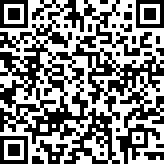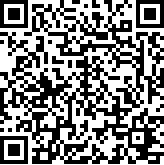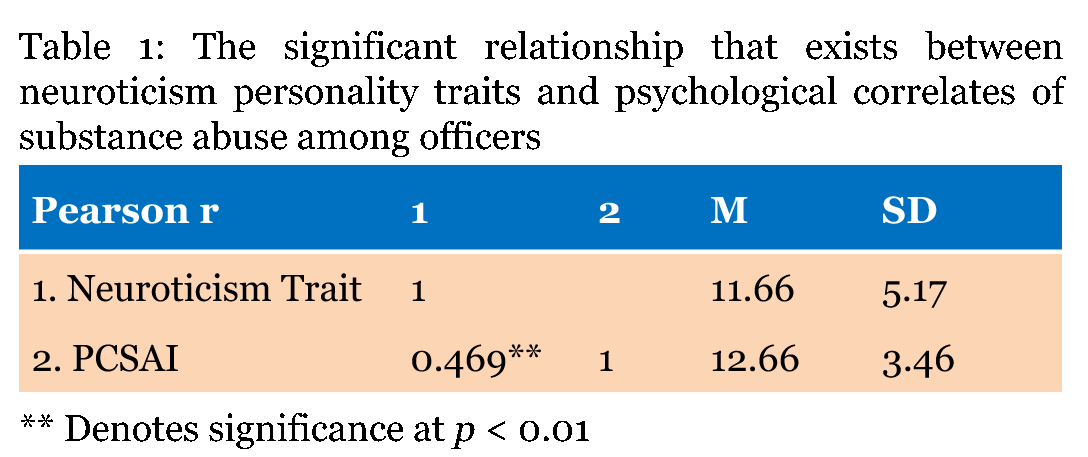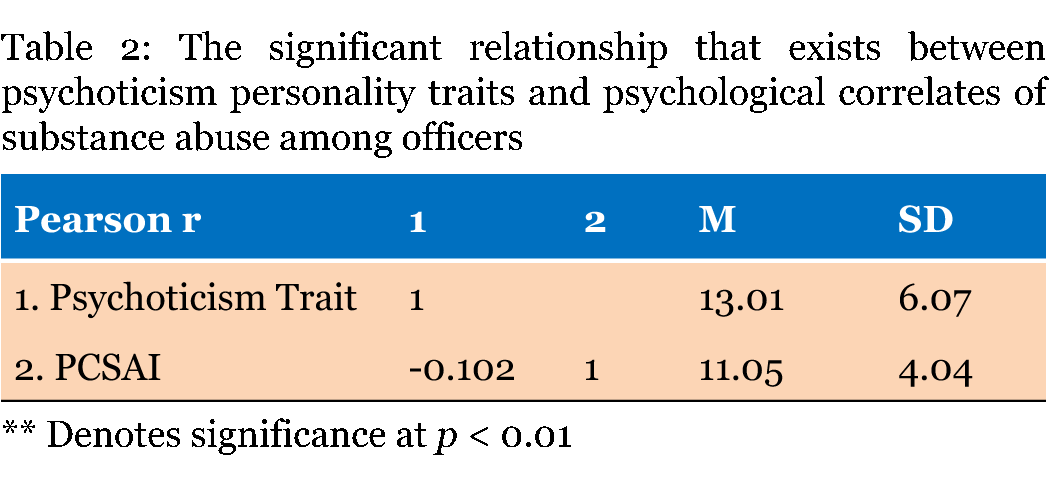| Table of Contents |  |
|
Original Article
| ||||||
| Personality factors as correlates of substance abuse among officers of Nigeria immigration service | ||||||
| Okhakhume Aide Sylvester1, Olaseni Abayomi O.2 | ||||||
|
1PhD, Department of Psychology, University of Ibadan, Ibadan.
2MSc, Department of Psychology, University of Ibadan, Ibadan. | ||||||
| ||||||
|
[HTML Abstract]
[PDF Full Text]
[Print This Article]
[Similar article in Pumed] [Similar article in Google Scholar] |
| How to cite this article |
| Sylvester OA, Olaseni AO. Personality factors as correlates of substance abuse among officers of Nigeria immigration service. Edorium J Psychol 2015;1:37–41. |
|
Abstract
|
|
Aims:
The purpose of the study was to examine personality traits as correlates of substance abuse among officers of Nigeria immigration service. The core aim was to examine the significant relationship between neuroticism personality trait and psychological correlates of substance abuse. It was further aimed to investigate the relationship between psychoticism personality trait and psychological correlates of substance abuse among officers of Nigeria immigration service.
Methods: The study adopted a non-experiment correlational design. Cluster random sampling was used to integrate a sum of 106 officers to participate in the study. Data were collected with a structured questionnaire. Pearson product moment correlation was used for statistical analysis. Results: Results revealed that there was significant positive relationship between Neuroticism personality traits and psychological correlates of substance abuse among officers of the Nigeria immigration Service (r = 0.46, df = 105, p < 0.01), while no significant relationship was established between psychoticism personality trait and psychological correlates of substance abuse among officers of the Nigeria immigration service (r = -0.10, df = 105, p > 0.05). Conclusion: The study therefore concluded that neuroticism personality trait not psychoticism personality trait had significant relationship with psychological correlates of substance abuse among officers of Nigeria immigration service. Recommendations that will be beneficial to the control of substance use/abuse among officers were suggested in the study. | |
|
Keywords:
Neuroticism, Personality factors, Psychological correlate, Psychoticism, Substance abuse
| |
|
Introduction
| ||||||
|
The recent rate of use and abuse of psychoactive substances in Nigeria has attracted interests of many and become issue of worry [1]. For instance, Nigeria is currently rated the highest consumer of cannabis and amphetamines in Africa [2]. It was further observed in a recent large study of a representative sample of Nigerian adults that the proportions of use of these substances to be alcohol 58%, tobacco 17%, sedatives 14%, substance 2.4% and 3% cannabis. It has, however, been suggested that the emerging trend in substance abuse in the country was apparently due to lack of existing international and local interventions in Nigeria, calling for a need to find an effective and suitable solution to the menace before it gets out of hand [1]. The broad range of substance abuse in the contemporary society is ever expanding [3]. More Nigerian are becoming drug addicts, while Nigeria gradually graduates from a drug consuming nation to a drug producing one. Despite several efforts by the Nigerian Drug Law Enforcement Agency to contain the diverse problems of illicit drugs production, circulation, marketing and consumption in Nigeria, more people are being recruited daily by drug barons to serve as couriers just as many more, especially youths are increasingly becoming addicted to assorted drugs [4] [5]. Substance use behavior in Nigeria was identified to be more prevalent among military and paramilitary officers especially, substances that are majorly common in Nigeria, such as hemp, methamphetamine, syrups and tablets with codeine. To most non-military or paramilitary substance abusers in the rehab, the most common source of purchase is military barracks, and establishments around or within barracks, such as schools, motor parks and even local traders [6]. Aside from ensuring adequate security outside the country, the paramilitary force (PMF) ensures internal security, providing safety and security of people and materials at instances of elections and other national assignments, and disaster management. Officers of PMF are at a high risk of being exposed to stress as a result of their job situations, which subsequently predispose them to experiencing negative emotions such as anxiety, frustration, and dysfunctional anger. In addition, the nature of their job such as intra or inter-country posting, distanced family, inadequate remuneration among others pose much pressure to the psychological wellbeing this in turn make them more susceptible to some unhealthy behavior such as substance abuse. Substance use and abuse among the paramilitary officers therefore equally become a serious matter of concern with evidence suggesting certain personality traits as psychological correlates of the hazardous behavior [7]. Men and officers of the Nigeria immigration service officers are not left out, due to the regimental nature of their job and other factors. The patterns of drug and alcohol used among officers of Nigeria immigration service are not left out of the worrisome phenomenon of substance use disorder. A number of risk factors have been implicated in the etiology of substance abuse behavior among different groups. These risk factors range from personality traits of impulsivity, negative affectivity, cognitive distortions, low self-esteem, peer pressure, frustration, etc. [8]. Of these factors, the current study aims at exploring psychological (personality) factors that relate to the motivation for drug and alcohol use among officers of Nigeria immigration Service. Personality traits have earlier been identified as core factors that attempt to explain why some officers are drawn to substance use [9]. Personality types of individuals play a significant role influencing the behavioral outcome of substance use and abuse. For instance, the type of personality of an individual may serve as either predisposing or protective factor in individuals' involvement in drugs of abuse. For instance, neurotic people have a higher tendency to experience negative affect such as frustration, depression, anxiety among others, this makes them more likely to turn to psychoactive substances as a form of coping with their negative usual affects especially when confronted with stressors. In a related study by Ifeagwazi on personality traits and substance abuse, he concluded that there is a strong relationship between neuroticism and substance abuse. According to him, high scorers in neuroticism experience various negative emotions such as anxiety, depression, anger, shame, guilt, sadness and hostility. These negative unpleasant states have been linked with alcohol and drug abuse. Similarly, Anderson revealed that participants with high scores on psychoticism exhibit some personality and behavioral traits such as impulsivity, aggressiveness, egocentrism and antisocial tendencies and these traits have been shown to correlate with substance abuse [9][10] [11]. Spiro and Turiano further explained that neuroticism personality trait is associated with substance use, with high neurotic individuals being more likely to smoke cigarettes and smoke a greater quantity of cigarettes [12]. Terracciano, Lockenhoff, Crum and Costa asserted that those high in neuroticism personality are also more likely to abuse alcohol [13]. Furthermore, in a longitudinally study conducted by Hampson et al., evidence provided suggests that children rated low in emotional stability predicted greater alcohol use later in life, some 40 years later in middle age [14]. The overall domain of neuroticism and underlying facets such as negative affect also been have positively related with marijuana, cocaine, and heroin use [15]. Substance use among paramilitary officers is not without negative effects which may be sometimes severe. For instance, impairment in personal relationships, occupational and social functioning, which may translate to poor service discharge, corruption and irregularities, domestic and workplace violence and even death of abusers may not be far from individuals caught up in the habit of use and abuse of psychoactive substances. Versed knowledge of the relationship that exists between personality and substance abuse therefore become immense which could turn out useful in the management of officers who abuse substances. In this regard, the current study investigates relationship of personality factors and implications on substance abuse among officers of the Nigeria immigration services. In order to achieve the objective of this study, we hypothesized a significant positive relationship between neuroticism personality trait and substance abuse among officers of the Nigeria immigration service. We also expect that there will be a significant negative relationship between psychoticism personality trait and substance abuse among officers of the Nigeria immigration service. | ||||||
|
Materials and Methods
| ||||||
|
Research Design Participants Instruments The Neuroticism scale used in the study is the subset of personality inventory developed by Eyesenck and Eyesenck [16] and standardized for Nigerian use by Eyesenck, Adelaja, and Eyesenck [17]. The 23 items neuroticism scale is reliably validated. The Nigeria norms provided are as follows males 6.43; female 8.42. The items are scored as '1' point for a 'yes' response in neuroticism [17]. The psychoticism scale used in the study is also the subset of personality inventory developed by Eyesenck [16]. The 25 items psychoticism scales are reliable and validated. The Nigeria norms are as follow; males 4.6, females 2.97 for the 1st 14 items scored '1' point for a 'yes' respond while 11 other items carry'1' point or a 'no response'. The psychological correlated of substance abuse index (PCSAI) was developed and validated Etim and Ottu [18]. The scale is a 22-item instrument with 5-point Likert format of 'strongly agree, agree, undecided, disagree and strongly disagree. The PCSAI is designed to measure the level of respondent's psychological predisposition to substance use/abuse behavior. The scale yields a coefficient alpha reliability estimated at 0.88 in the present study. Procedure | ||||||
|
Results | ||||||
|
Hypothesis 1 Hypothesis 2 | ||||||
| ||||||
|
| ||||||
| ||||||
|
Discussion
| ||||||
|
The present study examined the personality factors as correlates of substance abuse among officers of Nigeria immigration service. It was established that there is significant relationship between neuroticism personality trait and substance abuse. Similarly, the study of Spiro and Turiano, which revealed that neuroticism has clear associations with substance use, he further claimed that neurotic individuals being more likely to smoke cigarettes and smoke a greater quantity of cigarettes [12]. Empirical evidence indicates that persons with high scores on neuroticism i.e., emotional unstable are predisposed to psychological challenges including anxiety, depression, anger, shame, guilt, sadness, and hostility and these negative unpleasant states have been linked with alcohol and drug use [9]. This may be the reason participants with emotional instability tend feel their emotions as negative and might seems unpleasant to them, this would therefore pave way for the quest of getting out of such emotional feelings as such resort into substance abuse because of its euphoric feelings and emotional make up. The present study further established that there is no significant relationship between psychoticism personality trait and substance abuse. The study further revealed the direction of the insignificant relationship that exists between the two variables to be negative. This outcome did not align with the assertion of Anderson in a similar research work which revealed that participants with high scores on psychoticism trait exhibited behavior that have been shown to correlate with substance abuse [9]. The authority in the Nigeria immigration service should take into consideration the salient impact of personality in the predisposition to the abuse of substances among officer of the paramilitary. Training and workshop should be conducted periodically for the vulnerable officers (officers with high scores on neuroticism scale) and training should entails adequate supplement psychological skills that can stabilizes ones emotional instability such as relaxation training, stress inoculation training, objective coping skill, etc. Future research should replicate similar research interest among drug abused inpatient undergoing treatment. | ||||||
|
Conclusion
| ||||||
|
This study investigated the personality factors as correlates of substance abuse among officers of Nigeria immigration service. From the findings of the study it was established that neuroticism personality trait positively correlated with substance abuse significantly, while psychoticism personality trait did not significant correlate psychological correlates of substance abuse. | ||||||
|
Acknowledgements
| ||||||
|
We are thankful to Olaseni Victory Nifemi, Olaseni Morenike Vivian, Agberotimi Femi for their help and support. | ||||||
|
References
| ||||||
| ||||||
|
[HTML Abstract]
[PDF Full Text]
|
|
Author Contributions:
Okhakhume Aide Sylvester – Substantial contributions to conception and design, Acquisition of data, Analysis and interpretation of data, Drafting the article, Revising it critically for important intellectual content, Final approval of the version to be published Acquisition of data, Analysis and interpretation of data Abayomi Oladele Olaseni – Conception and design, Acquisition of data, Analysis and interpretation of data, Drafting the article, Final approval of the version to be published. |
|
Guarantor of submission
The corresponding author is the guarantor of submission. |
|
Source of support
None |
|
Conflict of interest
Authors declare no conflict of interest. |
|
Copyright
© 2015 Okhakhume Aide Sylvester et al. This article is distributed under the terms of Creative Commons Attribution License which permits unrestricted use, distribution and reproduction in any medium provided the original author(s) and original publisher are properly credited. Please see the copyright policy on the journal website for more information. |
|
|






